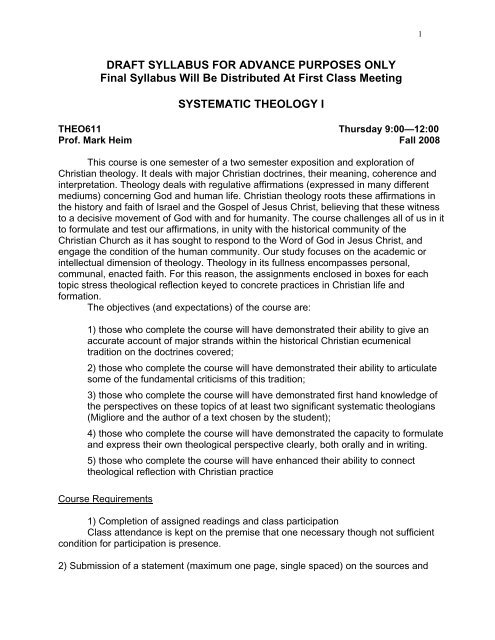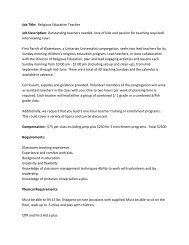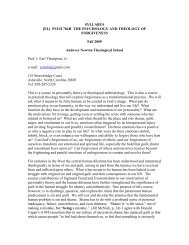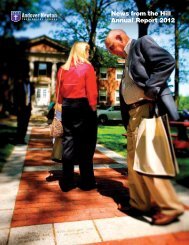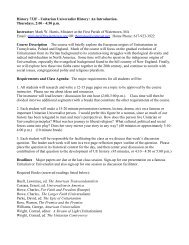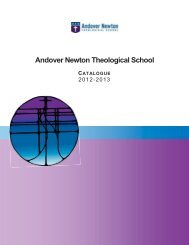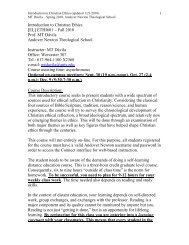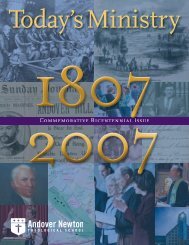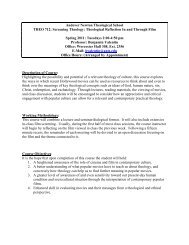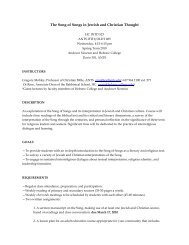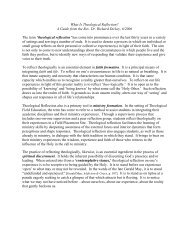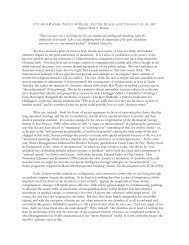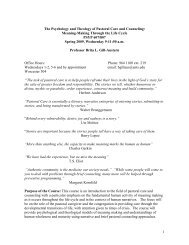Systematic Theology I - Andover Newton Theological School
Systematic Theology I - Andover Newton Theological School
Systematic Theology I - Andover Newton Theological School
Create successful ePaper yourself
Turn your PDF publications into a flip-book with our unique Google optimized e-Paper software.
1<br />
DRAFT SYLLABUS FOR ADVANCE PURPOSES ONLY<br />
Final Syllabus Will Be Distributed At First Class Meeting<br />
SYSTEMATIC THEOLOGY I<br />
THEO611 Thursday 9:00—12:00<br />
Prof. Mark Heim Fall 2008<br />
This course is one semester of a two semester exposition and exploration of<br />
Christian theology. It deals with major Christian doctrines, their meaning, coherence and<br />
interpretation. <strong>Theology</strong> deals with regulative affirmations (expressed in many different<br />
mediums) concerning God and human life. Christian theology roots these affirmations in<br />
the history and faith of Israel and the Gospel of Jesus Christ, believing that these witness<br />
to a decisive movement of God with and for humanity. The course challenges all of us in it<br />
to formulate and test our affirmations, in unity with the historical community of the<br />
Christian Church as it has sought to respond to the Word of God in Jesus Christ, and<br />
engage the condition of the human community. Our study focuses on the academic or<br />
intellectual dimension of theology. <strong>Theology</strong> in its fullness encompasses personal,<br />
communal, enacted faith. For this reason, the assignments enclosed in boxes for each<br />
topic stress theological reflection keyed to concrete practices in Christian life and<br />
formation.<br />
The objectives (and expectations) of the course are:<br />
1) those who complete the course will have demonstrated their ability to give an<br />
accurate account of major strands within the historical Christian ecumenical<br />
tradition on the doctrines covered;<br />
2) those who complete the course will have demonstrated their ability to articulate<br />
some of the fundamental criticisms of this tradition;<br />
3) those who complete the course will have demonstrated first hand knowledge of<br />
the perspectives on these topics of at least two significant systematic theologians<br />
(Migliore and the author of a text chosen by the student);<br />
4) those who complete the course will have demonstrated the capacity to formulate<br />
and express their own theological perspective clearly, both orally and in writing.<br />
5) those who complete the course will have enhanced their ability to connect<br />
theological reflection with Christian practice<br />
Course Requirements<br />
1) Completion of assigned readings and class participation<br />
Class attendance is kept on the premise that one necessary though not sufficient<br />
condition for participation is presence.<br />
2) Submission of a statement (maximum one page, single spaced) on the sources and
2<br />
authorities for theology in your own practice. This paper is due at the second class<br />
meeting. **Thursday, September 18** This paper will NOT be graded, but submitting<br />
the paper, on time, is a requirement.<br />
Do not labor over this paper. It is meant to serve as a snapshot of your perspective<br />
at the moment. To what sources do you turn when reflecting theologically? There may be<br />
many life questions for which you believe your own individual experience or wisdom is<br />
entirely sufficient to provide the right answer or guidance. But when there are important<br />
issues that you do not believe you have the resources to resolve on your own authority,<br />
what other sources carry weight with you, would strongly influence your conclusion. What<br />
counts most for you and why? Don't attempt to change what you think or how you<br />
approach things: just try to name and articulate your present practice.<br />
3) Three papers<br />
These are in the nature of "take home exams" and are due by 5:00 p.m.on the<br />
dates indicated in the syllabus. The paper questions will be distributed in class. Papers<br />
are to be no more than 3000 words, typewritten and double-spaced. Late papers will be<br />
accepted, but the grade will be discounted for lateness on a graduated time scale (the<br />
later it is, the more it will be graded down). You have a two day grace period in which the<br />
clock does not start ticking. So no need to ask if late papers will be accepted or if you can<br />
have an extension. Obviously the curve of deductions is such that a "point of no return" is<br />
eventually reached (the point at which an A paper will be discounted to an F). The lower<br />
the quality of the work submitted, the sooner this point comes! NOTE: Completion of<br />
these papers is a requirement of the course. The failure to submit one paper means<br />
failing the course (i.e. you receive an F for the semester, not the average of one F and<br />
your other grades). Extensions (that is, suspension of the graduated deduction for<br />
lateness) are not given except for medical, personal or family emergencies which receive<br />
the Dean's approval.<br />
Grading<br />
Students are reminded that <strong>Andover</strong> <strong>Newton</strong> students can elect to take a course<br />
on a pass/fail basis. Consult the catalog for the details and regulations.<br />
Each of the 3 papers just described will count 1/3 of the final grade.<br />
In addition there are possibilities to earn extra credit up to a total of 6 points. Each<br />
point raises your final grade .05 points (i.e. a final grade of 3.0 or B becomes 3.3 or B+<br />
with six extra credit points). Extra credit will not be accepted as a substitute for any<br />
required work.<br />
1) Extra credit will be given for submission of a written commentary or critique (no<br />
more than 1 page, single-spaced) on any selection in the assigned reading<br />
from Charry ed., INQUIRING AFTER GOD (no more than one paper per<br />
section of the course)<br />
2) Extra credit will be given for a meeting of your discussion group outside class<br />
time, for which a one page summary report is submitted on behalf of the group within one<br />
week of the meeting. No extra credit is given for discussion group meetings that are part<br />
of the schedule during regular class hours. The meeting must deal with subject matter<br />
being covered in the section at the time of the meeting. Credit will be given to each<br />
member present at the meeting (1 point each) up to a maximum of 3 meetings.
3<br />
Discussion Groups<br />
To provide opportunity for discussion of the class material and the reading<br />
assignments, primarily in preparation for writing the papers, small discussion groups will<br />
meet a maximum of three times during the class period in the course of the semester.<br />
The groups are to have 3-5 members and they are to be self-selected. These meetings<br />
are essential to the course, as one of the crucial features of theological education for<br />
ministry is the ability to deal with theological issues in discussion, conversation, argument<br />
and response. Please form your discussion group as soon as possible, and register it. If<br />
you are having difficulty, speak to Prof. Heim.or to Lisa Abbott.<br />
Office Hours<br />
Prof. Heim's office is Worcester 310. The phone is 617 964-1100 x247. His home<br />
phone is 617 965-5291. His email address is mheim@ants.edu. If we cannot talk in<br />
person, email is the preferred mode of contact. Prof. Heim will keep office hours on<br />
Thursdays from 12:00—1:00. He will meet at other times by appointment.<br />
Practical Questions<br />
All registered members of the class are free to tape record plenary class sections<br />
(not discussion groups) solely for their personal use.<br />
Each student needs to select her/his own systematics text AS SOON AS<br />
POSSIBLE. A list of approved possibilities will be distributed (and is also available on the<br />
web site of the class). Please register your selection as soon as you can. You are free to<br />
propose a text not on the list, but it must be approved by Prof. Heim.<br />
As the class meets only once a week, our time is very precious. Classes will begin<br />
promptly and students are expected to be in place and ready to begin.<br />
Course Web Page<br />
All <strong>Andover</strong> <strong>Newton</strong> students must have a school email account and be registered<br />
in the CONNECT Learning Center, where there is a site for this course. Be sure that you<br />
have access to the site and can be reached by email through the site.<br />
Books<br />
The required readings for the course are all on reserve in the library. The<br />
bookstore has copies of Migliore, Niebuhr, Burns, Norris and Rusch. The Charry book is<br />
out of print this fall. It is on reserve in the library. The Charry readings in our syllabus are<br />
available for reading (they cannot be downloaded) on the class web site in Blackboard<br />
(under “course documents”). The bookstore has ordered some copies of all the other<br />
assigned readings that are in print. There is no way to estimate demand for these, so act<br />
quickly! In addition, the bookstore has stocked a selection of systematics texts from the<br />
list distributed to you in class. The bookstore does not have all the books on the list by<br />
any means. Look first in our library and then in other BTI libraries if the book you desire is<br />
not available in the bookstore.<br />
Academic Regulations
4<br />
Students are reminded that academic regulations outlined in the <strong>Andover</strong> <strong>Newton</strong><br />
catalog and in the bulletin from the Dean's office at the beginning of each semester are to<br />
be strictly observed. In particular, all students should be aware that plagiarism is a severe<br />
academic offense and will receive strong disciplinary action. If you are in any doubt about<br />
proper attribution of sources, inquire or consult a writing manual for academic work.<br />
SECTION ONE: REVELATION AND AUTHORITY<br />
Class Meetings: September 11<br />
September 18<br />
***** PAPER DUE THURSDAY SEPTEMBER 18 *****<br />
Readings: Daniel Migliore, FAITH SEEKING UNDERSTANDING, Chapters 1-3<br />
and Appendix A "Natural <strong>Theology</strong>"<br />
The appropriate section in your selected systematics text<br />
-----------------------------------------------------------------------------------------------------------------<br />
David S. Dockery, "The Divine-Human Authorship of Inspired<br />
Scripture," in Duane A. Garrett and Richard R. Melick Jr. eds., AUTHORITY AND<br />
INTERPRETATION [Available on electronic reserve for this course]<br />
AND EITHER Sallie McFague, METAPHORICAL THEOLOGY,<br />
Chapter One [Available on electronic reserve for this course]<br />
OR Juan Luis Segundo, THE LIBERATION OF<br />
THEOLOGY, Chapter One [Available on electronic reserve for this course]<br />
“Inquiring After God When Meditating On Scripture” (Chapter 9) in Ellen Charry ed.,<br />
INQUIRING AFTER GOD [available on the course web site under “Course Documents”]<br />
------------------------------------------------------------------------------------------------------------<br />
Supplementary Bibliography: Ellen Charry, BY THE RENEWING OF YOUR MINDS; Stephen E.<br />
Fowl ed., THE THEOLOGICAL INTERPRETATION OF SCRIPTURE; Paul Griffiths, RELIGIOUS<br />
READING; Ian Fraser, REINVENTING THEOLOGY AS THE PEOPLE'S WORK; Elizabeth Schussler<br />
Fiorenza, BREAD NOT STONE; H. Richard Niebuhr, THE MEANING OF REVELATION; Charles Hefling,<br />
WHY DOCTRINES?; Margaret Miles, IMAGE AS INSIGHT; George Lindbeck, THE NATURE OF<br />
DOCTRINE; James Cone, GOD OF THE OPPRESSED; Lesslie Newbigin, PROPER CONFIDENCE;<br />
Nancey Murphy, BEYOND LIBERALISM AND FUNDAMENTALISM, THEOLOGY IN AN AGE OF<br />
SCIENTIFIC REASONING; Letty Russell, FEMINIST INTERPRETATION OF THE BIBLE; Paul Achtemeier,<br />
THE AUTHORITY OF SCRIPTURE; Gabriel Fackre, THE CHRISTIAN STORY: VOLUME TWO,<br />
REVELATION; Jose Miguez Bonino, DOING THEOLOGY IN A REVOLUTIONAY SITUATION; Karl Barth,<br />
CHURCH DOGMATICS I/1; John A.T. Robinson, CAN WE TRUST THE NEW TESTAMENT?; William<br />
Abraham, CANON AND CRITERION IN CHRISTIAN THEOLOGY: FROM THE FATHERS TO FEMINISM;<br />
Joerg Rieger, GOD AND THE EXCLUDED: VISIONS AND BLIND SPOTS IN CONTEMPORARY<br />
THEOLOGY; C.S. Song, THE COMPASSIONATE GOD; Avery Dulles, MODELS OF REVELATION; Nelle<br />
Morton, THE JOURNEY IS HOME; Colin Gunton, A BRIEF THEOLOGY OF REVELATION; Helmut<br />
Thielicke, A LITTLE EXERCISE FOR YOUNG THEOLOGIANS; Kosuke Koyama, WATERBUFFALO<br />
THEOLOGY; Reinhard Hutter, SUFFERING DIVINE THINGS: THEOLOGY AS CHURCH PRACTICE;<br />
David Tracy, THE ANALOGICAL IMAGINATION; Kwesi Dickson and Paul Ellingworth eds., BIBLICAL<br />
REVELATION AND AFRICAN BELIEFS; Carl F.H. Henry, GOD, REVELATION AND AUTHORITY,<br />
Volumes 1 and 2; Bernard Lonergan, METHOD IN THEOLOGY and INSIGHT; Van Harvey, THE
5<br />
HISTORIAN AND THE BELIEVER<br />
SECTION TWO: HUMANITY<br />
Class Meetings: September 25<br />
October 2<br />
October 9<br />
Reading: Daniel Migliore, FAITH SEEKING UNDERSTANDING, Chapters 5 and<br />
7<br />
The appropriate section in your selected systematics text<br />
-------------------------------------------------------------------------------------------------------------<br />
J. Patout Burns ed., THEOLOGICAL ANTHROPOLOGY, Chapters 2-6<br />
Reinhold Niebuhr, THE NATURE AND DESTINY OF MAN, Volume One<br />
(omit Chapters 2 and 3)<br />
-------------------------------------------------------------------------------------------------------------<br />
Rosemary Ruether, SEXISM AND GOD-TALK, Chapter 4 [Available on<br />
electronic reserve for this course]<br />
Mary Ann Hinsdale, “Heeding the Voices: An Historical Overview” and<br />
Mary Catherine Hilkert, “Cry Beloved Image: Rethinking the Image of God” (Chapters 2<br />
and 11) in Ann O’Hara Graff ed., IN THE EMBRACE OF GOD: FEMINIST<br />
APPROACHES TO THEOLOGICAL ANTHROPOLOGY [Chapter 11 is available on<br />
electronic reserve for this course]<br />
“Inquiring After God Through Discernment” (Chapter 3), in Ellen Cherry ed.,<br />
INQUIRING AFTER GOD [Available on the class web site in CONNECT]<br />
________________________________________________________________<br />
***** PAPER DUE THURSDAY OCTOBER 16 *****<br />
--------------------------------------------------------------------------------------------------------------<br />
Supplementary Bibliography: Anne E. Carr, TRANSFORMING GRACE: CHRISTIAN TRADITION<br />
AND WOMEN'S EXPERIENCE; Georges Florovsky, CREATION AND REDEMPTION; Blaise Pascal,<br />
PENSEES; Gustavo Gutierrez, THE POWER OF THE POOR IN HISTORY; Howard Thurman, JESUS AND<br />
THE DISINHERITED; Nikolai Berdyaev, THE DESTINY OF MAN; Vladimir Lossky, IN THE IMAGE AND<br />
LIKENESS; Soren Kierkegaard, SICKNESS UNTO DEATH and PURITY OF HEART IS TO WILL ONE<br />
THING; Elaine Pagels, ADAM, EVE AND THE SERPENT; Ted Peters: SIN: RADICAL EVIL IN SELF AND<br />
SOCIETY; Judith Plaskow, SEX, SIN AND GRACE; E.O. Wilson, ON HUMAN NATURE; Elaine Storkey<br />
and Margaret Hebblethwaite, CONVERSATIONS ON CHRISTIAN FEMINISM: SPEAKING HEART TO<br />
HEART; Philip Hefner, THE HUMAN FACTOR; Emerito Nacpil and Douglas Edwards eds., THE HOLY<br />
AND THE HUMAN; Wolfhart Pannenberg, ANTHROPOLOGY IN THEOLOGICAL PERSPECTIVE; Phyllis<br />
Trible, GOD AND THE RHETORIC OF SEXUALITY; Charles Hodge, SYSTEMATIC THEOLOGY, Volume<br />
Two; Letty Russell, BECOMING HUMAN; Albert A. Cleage Jr., BLACK MESSIAH; James Nelson,<br />
EMBODIMENT; Juan Luis Segundo, EVOLUTION AND GUILT; Niels Henrik, Gregersen, Willem Drees and<br />
Ulf Gorman eds., THE PERSON IN SCIENCE AND THEOLOGY; Teilhard de Chardin, THE<br />
PHENOMENON OF MAN; Julia O'Faolain and Lauro Martines eds., NOT IN GOD'S IMAGE; Dorthee Solle,<br />
TO WORK AND TO LOVE; Ann O'Hara Graff ed., IN THE EMBRACE OF GOD: FEMINIST APPROACHES<br />
TO THEOLOGICAL ANTHROPOLOGY; Daphne Hampson ed., SWALLOWING A FISHBONE? FEMINIST<br />
THEOLOGIANS DEBATE CHRISTIANITY; Dwight Hopkins, BEING HUMAN: RACE, CULTURE AND<br />
RELIGION; Elizabeth Stuart, GAY AND LESBIAN THEOLOGIES
6<br />
SECTION THREE: PERSON AND WORK OF CHRIST<br />
Class Meetings: October 16<br />
October 23<br />
October 30<br />
November 6<br />
Reading: Daniel Migliore, FAITH SEEKING UNDERSTANDING, Chapters 8, 9 and<br />
Appendix B "The Resurrection: A Dialogue"<br />
The appropriate section in your selected systematics text<br />
----------------------------------------------------------------<br />
Richard A. Norris Jr. ed., THE CHRISTOLOGICAL CONTROVERSIES,<br />
Chapters 3-6 and pp. 155-159.<br />
John Calvin, INSTITUTES OF THE CHRISTIAN RELIGION, Book Two,<br />
Chapters 12 (sections 1-5 only), 15, 16 (omitting sections 8-12), 17. [Available online at<br />
http://www.reformed.org/master/index.html?mainframe=/books/institutes/ OR<br />
http://www.ccel.org/ccel/calvin/institutes.toc.html These sites can be accessed through links on the class<br />
web site on CONNECT]<br />
----------------------------------------------------------------<br />
James Cone, A BLACK THEOLOGY OF LIBERATION, "Preface" and<br />
Chapter 6, "Christ in Black <strong>Theology</strong>." [Available on electronic reserve for this course]<br />
Jacquelyn Grant, WHITE WOMEN'S CHRIST, BLACK WOMEN'S<br />
JESUS, Chapter 7 [Available on electronic reserve for this course]<br />
Mercy Oduyoye and Virginia Fabella, WITH PASSION AND<br />
COMPASSION, Chapter 3, Therese Souga and Louise Tappa, "The Christ-Event from<br />
the Viewpoint of African Women" [Available on electronic reserve for this course]<br />
S. Mark Heim, “Saved By What Shouldn’t Happen: The Anti-sacrificial<br />
Meaning of the Cross” in Marit Trelstad ed., CROSS-EXAMINATIONS [Available on<br />
electronic reserve for this course]<br />
“Inquiring After God Through Art” (Chapter 12) in Ellen Charry ed., INQUIRING<br />
AFTER GOD [Available on electronic reserve for this course]<br />
________________________________________________________________<br />
***** PAPER DUE FRIDAY NOVEMBER 13 *****<br />
-------------------------------------------------------------------------------------------------------------<br />
Supplementary Bibliography: Aloys Grillmeier, CHRIST IN CHRISTIAN TRADITION; D.M. Baillie,<br />
GOD WAS IN CHRIST; Jon Sobrino, CHRISTOLOGY AT THE CROSSROADS; Patricia Wilson-Kastner,<br />
FAITH, FEMINISM AND THE CHRIST; John Hick ed., THE MYTH OF GOD INCARNATE; Michael Green<br />
ed., THE TRUTH OF GOD INCARNATE; C.F.D. Moule, THE ORIGIN OF CHRISTOLOGY; C. Stephen<br />
Evans, THE HISTORICAL CHRIST AND THE JESUS OF FAITH: THE INCARNATIONAL NARRATIVE AS<br />
HISTORY; Edward Schillebeeckx, JESUS, CHRIST; Geza Vermes, JESUS THE JEW; Jaraslov Pelikan,<br />
JESUS THROUGH THE CENTURIES; Kelly Brown Douglas, THE BLACK CHRIST; Rita Nakashima Brock,<br />
JOURNEY BY HEART; A CHRISTOLOGY OF EROTIC POWER; Wolfhart Pannenberg: JESUS: GOD AND<br />
MAN; Elsa Tamez, THROUGH HER EYES: WOMEN'S THEOLOGY FROM LATIN AMERICA; G.K.
7<br />
Chesterton, THE EVERLASTING MAN; Elisabeth Schussler Fiorenza, JESUS: MIRIAM’S CHILD,<br />
SOPHIA’S PROPHET; Carter Heyward, "Re-imaging Jesus: Power in Relation," in THE REDEMPTION OF<br />
GOD; Rosemary Ruether, "Christology-Can a Male Savior Save Women?" in SEXISM AND GOD-TALK;<br />
Thomas F. Torrance, SPACE, TIME AND INCARNATINON; Jurgen Moltmann, THE CRUCIFIED GOD; S.<br />
Mark Heim, SAVED BY SACRIFICE: A THEOLOGY OF THE CROSS; Welsey Wildman, FIDELITY WITH<br />
PLAUSIBILITY: MODEST CHRISTOLOGIES IN THE TWENTIETH CENTURY; Michael Grant, JESUS;<br />
Milan Machovec, A MARXIST LOOKS AT JESUS; Gustaf Aulen, CHRISTUS VICTOR; Robin M. Jensen,<br />
THE SUBSTANCE OF THINGS SEEN: ART, FAITH AND THE CHRISTIAN COMMUNITY; G.H. Williams,<br />
"Christology and Church-State Relations in the Fourth Century," CHURCH HISTORY, XX, 3, pp. 3-33 and<br />
XX, 4, pp. 3-26. [There are recent “historical Jesus” books without number. A good sampling would be<br />
John Dominic Crossan, JESUS: A REVOLUTIONARY BIOGRAPHY; Marcus Borg, MEETING JESUS<br />
AGAIN FOR THE FIRST TIME; Luke Timothy Johnson, THE REAL JESUS; Elisabeth Schussler Fiorenza,<br />
JESUS: MIRIAM’S CHILD, SOPHIA’S PROPHET, and Ben Witherington, THE CHRISTOLOGY OF JESUS.<br />
For good one volume “doses” see Paul Copan ed., WILL THE REAL JESUS STAND UP? and N.T. Wright<br />
and Marcus Borg, THE MEANING OF JESUS: TWO VISIONS]<br />
SECTION FOUR: GOD<br />
Class Meetings: November 13<br />
November 20<br />
November 27 [no class—ANTS fall break]<br />
December 4<br />
Reading: Daniel Migliore, FAITH SEEKING UNDERSTANDING, Chapters 4 & 6.<br />
The appropriate section in your selected systematics text<br />
-------------------------------------------------------------------------------------------------------------<br />
William G. Rusch, ed., THE TRINITARIAN CONTROVERSY, Chapters 2,<br />
3, 6, 10 (sections 1-48), 13.<br />
Vladimir Lossky, THE MYSTICAL THEOLOGY OF THE EASTERN<br />
CHURCH, Chapters 2-3.<br />
----------------------------------------------------------------------------------------------------------------<br />
John Cobb and David Griffin, PROCESS THEOLOGY: AN<br />
INTRODUCTORY EXPOSITION, Foreward and Chapters 1 and 3.<br />
Ada Maria Isasi-Diaz, HISPANIC WOMEN: A PROPHETIC VOICE IN<br />
THE CHURCH, Chapter 2 [Available on electronic reserve for this course]<br />
“Inquiring After God When At Prayer” (Chapter 13) in Ellen Charry ed., INQUIRING<br />
AFTER GOD [Available on the course web site under “Course Documents”]<br />
________________________________________________________________<br />
***** PAPER DUE WEDNESDAY DECEMBER 10 *****<br />
---------------------------------------------------------------------------------------------------------<br />
Supplementary Bibliography: Leonardo Boff, TRINITY AND SOCIETY; Augustine, ON THE<br />
TRINITY; Thomas Aquinas, SUMMA THEOLOGICA, Section One; Samuel Solivan, THE SPIRIT, PATHOS<br />
AND LIBERATION; Dorothy Sayers, THE MIND OF THE MAKER; Benjamin E. Mays, THE NEGRO'S<br />
GOD; Major Jones, THE COLOR OF GOD; Catherine Mowry LaCugna, GOD FOR US: THE TRINITY AND<br />
CHRISTIAN LIFE; John Zizioulas, BEING AS COMMUNION; Ruth Duck, GENDER AND THE NAME OF<br />
GOD; Paul S. Fiddes, PARTICIPATING IN GOD: A PASTORAL THEOLOGY OF THE TRINITY; Keith<br />
Ward, IMAGES OF ETERNITY: CONCEPTS OF GOD IN FIVE RELIGIOUS TRADITIONS; Charles<br />
Hartshorne, THE DIVINE RELATIVITY; Royce Gruenler, THE INEXHAUSTIBLE GOD; Thomas Oden, THE
LIVING GOD; Philip Clayton, THE PROBLEM OF GOD IN MODERN THOUGHT; William Placher, THE<br />
DOMESTICATION OF TRANSCENDENCE: HOW MODERN THINKING ABOUT GOD WENT WRONG;<br />
Mortimer Adler, HOW TO THINK ABOUT GOD; Elizabeth Johnson, SHE WHO IS; Donald Bloesch, GOD<br />
THE ALMIGHTY; Lescek Kolakowski, RELIGION; Mary Daly, BEYOND GOD THE FATHER; Kazoh<br />
Kitamori, THEOLOGY OF THE PAIN OF GOD; Malcom Diamond and Thomas Litzenburg eds., THE<br />
LOGIC OF GOD; John Polkinghorne, THE FAITH OF A PHYSICIST; Patrick Glynn, GOD: THE EVIDENCE;<br />
Hans Kung, DOES GOD EXIST?; Stan Wallace ed., DOES GOD EXIST? THE CRAIG-FLEW DEBATE;<br />
Carol Christ, "Why Women Need the Goddess," in WOMANSPIRIT RISING; Juan Luis Segundo, OUR<br />
IDEA OF GOD; Gordon Kaufman, THE THEOLOGICAL IMAGINATION: CONTRUCTING THE CONCEPT<br />
OF GOD; Henry Nelson Wieman, THE SOURCE OF HUMAN GOOD; William R. Jones, IS GOD A WHITE<br />
RACIST?; John Hick, EVIL AND THE GOD OF LOVE; John G. Stackhouse Jr., CAN GOD BE TRUSTED?:<br />
FAITH AND THE CHALLENGE OF EVIL; Dorthee Solle, SUFFERING; Richard Rubenstein, AFTER<br />
AUSCHWITZ; Peter van Inwagen ed., CHRISTIAN FAITH AND THE PROBLEM OF EVIL.<br />
8


